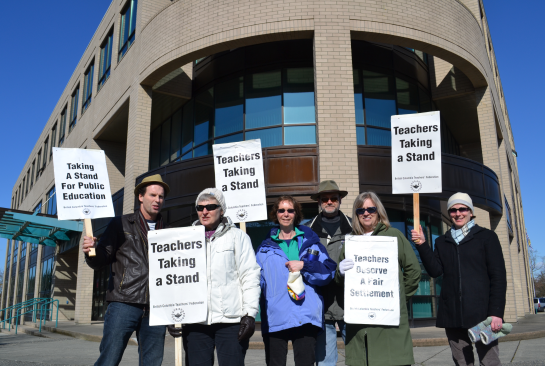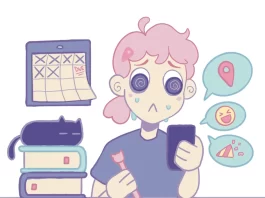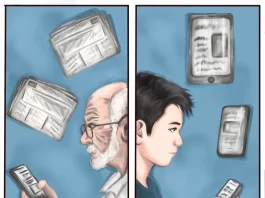Print Edition: March 14, 2012
Last week BC teachers across the province participated in phase two of their job action strike, lining the sidewalks outside their schools in a protest against government negotiation (or lack thereof) and Bill 22. They paced the sidewalks, through the cold, holding up signs that read messages like “teachers taking a stand,” and waving at cars to honk for support.
For three days, teachers organized shifts amongst themselves. The teachers went without pay other than the $50 strike pay from the BCTF per shift. Though it was illegal to set up picket lines, teachers were able to make sticket lines. The difference is picket lines do not allow any other people in the building, while sticket lines do. So receptionists, administration, and teaching assistants were still allowed into the building.
I thought that maybe one morning I would go and strike with the teachers. Though I wasn’t allowed to have $50 strike pay, teachers did let me talk to them and take pictures. I even got a coffee.
Listening to teachers at James Hill Elementary school in Langley, answers to questions about teacher’s priorities became pretty clear: why are they striking? What do they want out of the education system? Why does the government want something else out of that system?
I got to hear about the individual teacher’s opinion, rather than the whole of the BCTF. The men and women in the teaching profession know the education system best, and it’s their voices we should be listening carefully to, because something isn’t right at the negotiating table. Here is what a handful of striking teachers have to say about what their profession in this province is dealing with, and what their take on the situation is.
Advice for UFV students who want to get into teaching?
It seems every student has “teacher” as an option on their list of possible careers. It makes sense; if you are passionate about your subject, teaching it would be ideal. But the way the Liberals are treating those in the profession these days is disheartening: is it really an ideal job? What are people in the profession saying after years of contract stripping and fighting for every professional right?
The message seemed to be a mixture of encouragement and warning: “Be really aware of what the whole job entails,” fourth-grade teacher Sandi Takasaki said. “It’s a wonderful profession, but sometimes you are asked to make some hard choices.”
Takasaki’s colleague, music teacher Colleen Gidding, agreed and advised to teach “because you love it, not because you are going to make big dollars at it. The only reason you can get into teaching is because you love children, and you love education.”
With the net-zero negotiations and with teacher’s priorities set on funding for classrooms over salary increase, teaching as a profession is no goldmine. BC teachers are one of the lowest paid across Canada, in a place where the cost of living is one of the highest. For a profession that takes five-plus years in university to get into, that’s something else.
Shelia Greentree, a teacher working in a district program with behavioural disorders, said that despite this, she still encourages university students to consider becoming teachers.
“I would definitely suggest still going into teaching because teaching is so incredibly, deeply rewarding. I just wouldn’t recommend that they stay in this province to do it.”
Respect for the profession is sinking in BC. Another teacher on the sticket line who wished to be unnamed said although he loves his career, he has become increasingly unhappy with his working conditions. “There are fewer and fewer days when you go home satisfied, that you feel like you were able to do your job, and you’ve met the needs of your classroom. It’s become increasingly difficult to do that.” He continued on to say that, as a teacher in BC, the profession is “under-supported, and underappreciated. As a teacher I feel like we’ve given up so much in the past years… and we see our employers want more from us. So I don’t know.”
How are negotiations being handled?
After controversial and conflicting arguments and negotiations between, it was interesting to hear individual perspectives on how the negotiations have been carried out by the BCTF representatives by members of the BCTF. These people have a common, strong voice – but do they agree?
There were positive responses. The BCTF did well, considering the circumstances.
“I think the BCTF was put in a really difficult situation by an incredibly apathetic government that doesn’t value children or education, that’s really clear,” Greentree remarked. She continued:
“It’s really demoralizing, what the Liberal government has been doing to educate in the past 11 years. It’s awful for the parents, it’s awful for the students. [These negotiations] are about putting things in place so that children can succeed, and our government is so short-sighted… it’s really, really demoralizing and sad—personally and professionally sad—that everybody in education has been put in this position. I don’t think any system is perfect, but I think people have to work together, and the BCTF has done a really good job to open up negotiations, and the government had clearly said that they will negotiate within net zero which is really moot […] because there is no negotiation at net zero. For them to have got us into debt, this deficit, in the first place and for them to now [be] calling on us to step it up and not ask for anything… all our classroom composition and all our supports have been eroded, and it’s disgusting.”
Another teacher, who wished to remain unnamed, said he could hardly call it negotiating:
“I think it’s sort of misleading to describe them as negotiations… I know that we’ve had more than 70 bargaining sessions with the employer group… it’s hard to negotiate when the people on the other side of the table have basically drawn a line in the sand and said ‘we’re not prepared to give up anything here’ which is basically no wage increase […] and also, right smack dab on the table in front of them is a huge collection of things that they want to take from the employees… so how do I feel? I think we’ve tried to negotiate in good faith, but it’s hard when this is what you’re facing.”
For the thousands of teachers represented by one union and one voice, there are sure to be individual voices of discontent and dispute. But it seemed that what these teachers were individually asking for (working and classroom conditions, and funding and support for children who need it) were largely the same issues being spoken about at the table by the BCTF.
What issues should the BCTF be arguing for?
The BCTF brought a number of issues to the bargaining table, ranging from classroom conditions to increased benefits. One of the questions I asked a number of teachers was this: if you had the opportunity to make one decision about any of these issues brought to the table, which one would it be?
The answers were surprisingly similar: increased aid for students; Classroom size should be kept to a minimum for optimum support for students, with or without learning disabilities; increased support for students with disabilities; Classroom composition. The teachers who spoke with me were unanimous in their highest priority – helping their students’ learning conditions.
Greentree explained her personal situation in her classroom:
“I teach a special education class. My students are directly impacted by all the cuts the government has made. My student’s families are directly impacted by the lack of not only the supports in the education system, but by the lack of supports and the erosion of supports in all the mental health areas.”
Greentree said she would also look at classroom size and composition:
“It’s really paramount. I know a classroom with five identified students… for a teacher to try to meet the needs of such a range of students who, through our government who were supposed to have limited to three identified in a class room… You can only do what you can do. And it’s sad, it’s sad for teachers knowing that so many students need support in their classroom and they’re teaching across a spread of five different grade levels in their numeracy and literacy abilities… it’s depressing.”
Giddings, who is a music teacher at James Hill Elementary, said she would choose to get more support for special needs children. “More aids in the special needs category, more learning assistance teachers; we’re way too low when it comes to special-education assistants for working with children with challenges, and that’s my biggest issue.”
Another teacher on the sticket line said that as a teacher, he’d already made sacrifices to gain what he wanted in a new contract. But he still said he’d do it again if he had to. “To me it’s these two: resources for the students and class composition. Those are the things [that] allow me effectively to do my job and I hate to say it, but I’d again say as an employee that I’d give up a wage increase if those things could be dealt with. Unfortunately we’ve done that previously where we have agreed to give up wage increases for years in exchange for benefits for students. And the government has, with the stroke of the pen, taken those things directly away from us, and now we’ve been left with nothing. So if I could take one thing, it would be to help the students.”
But this time, the government doesn’t even seem to be giving teachers the option.
What do teachers want the public to know?
I’ve read a lot about the strife between the BCTF and the Liberal government. I’ve seen the commercials on TV, advertisements and articles in the newspapers, on the internet, on the radio from both sides of the negotiations tables. Both sides seem to be giving such different messages that it’s difficult to decipher what the problem is. The government, according to a recent advertisement, is giving special needs children $30 million a year in extra funding. The BCTF says in a Global News article that this funding would make up a fraction of what the government has cut back through the years. And so it goes on, back and forth.
I asked teachers on the sticket line to give me one clear message, something that an individual teacher wanted the public to know, putting aside the messages from either side of the negotiations.
Takasaki said that she would want the public to know that for teachers, “it’s not about money, it’s about kids in classrooms, and what classrooms look like and how they are put together, and how important class size is and configuration.”
Special education teacher Greentree said that she would want the public to look at the whole picture, at the story behind the conflicts in negotiations. “This erosion of services and supports have taken place over a fairly long period of time, this isn’t something that teachers kind of all of the sudden decide ‘oh, this is happening now, this year! oh, gee, we want our way,’” Greentree explained. “This has a much larger context. The way this government has treated this profession and the children who are not taxpayers, and the way that the whole system is devalued in the eyes of the liberal government… There is a bigger picture.”
“I would like people to understand that when the government backs a profession like ours into a corner, a profession that’s there to support and educate, we do have to stand up,” she continued. “There is no choice, because it’s for the long-term. That’s why we are teaching. It’s about the development of children.”
An intermediate teacher who wished to be unnamed turned the question around: “I’d reframe that and say: what is it that the public wants from their education system? Maybe teachers are misdirected, and misled; we believe that kids want a sound education, that every parent cares about their child, that their expectations for their child is that they will be prepared – prepared for tomorrow […] and to have the tools necessary to achieve. That’s why we’re here today. So I think that the parents are missing from this equation. I think that really, we need to find out what parents believe education is about.”
At this point, it seems to me that it is the teachers who need clarity, not the public. What do we as BC residents want out of our education system? Why are people in the teaching profession so frantic about the conditions of this system that they would strike, that they would push back, and fight the government? These are people who see the conditions every day, these are the people who know the exact limits imposed by funding cuts and contracts strips. These are the people we should be listening to.
Who knows what steps the BCTF will take next, but, as voters, we need to be aware. We should be keeping a close eye on the negotiating table: our future minds are at risk.





